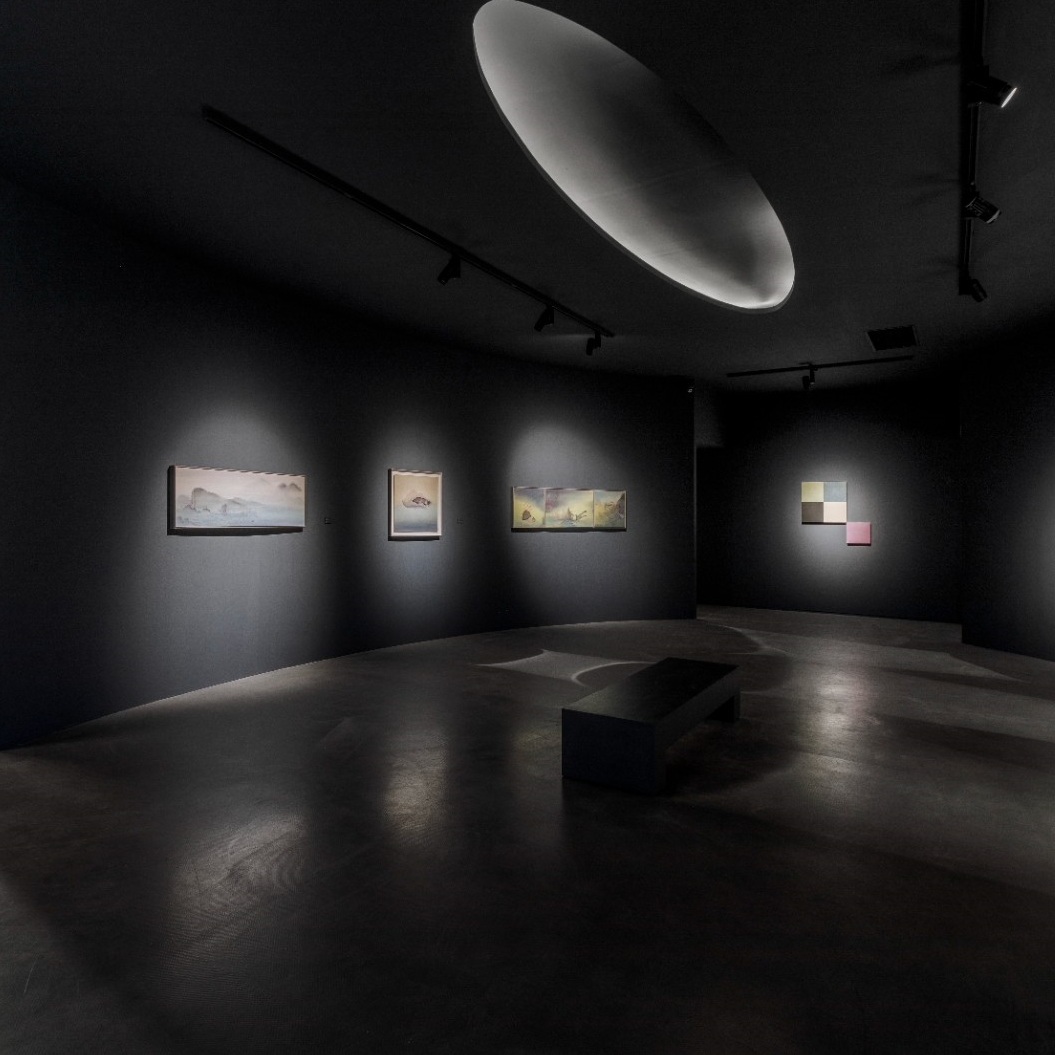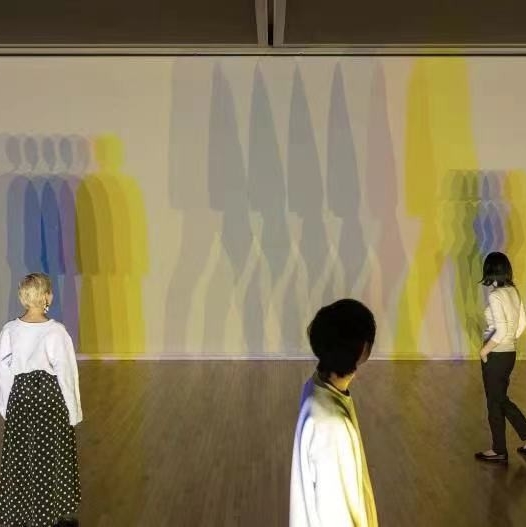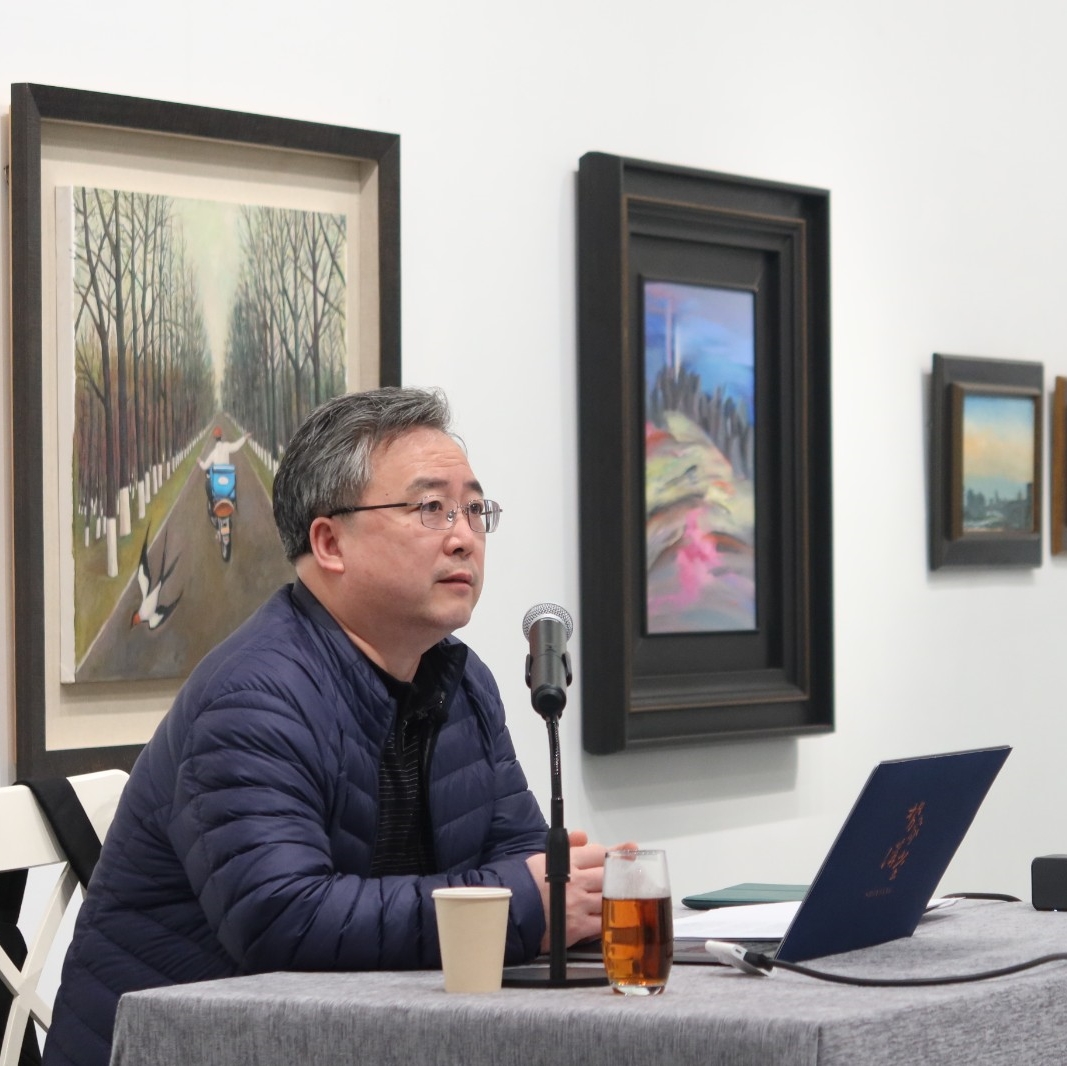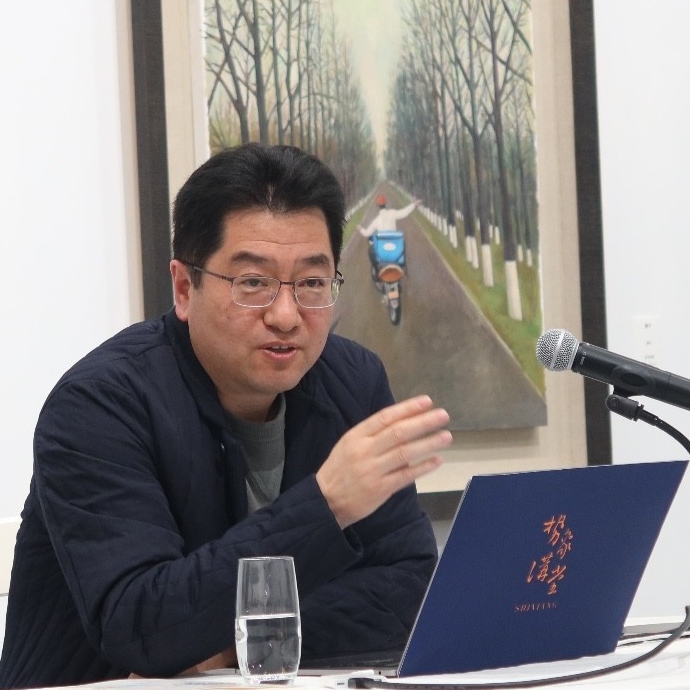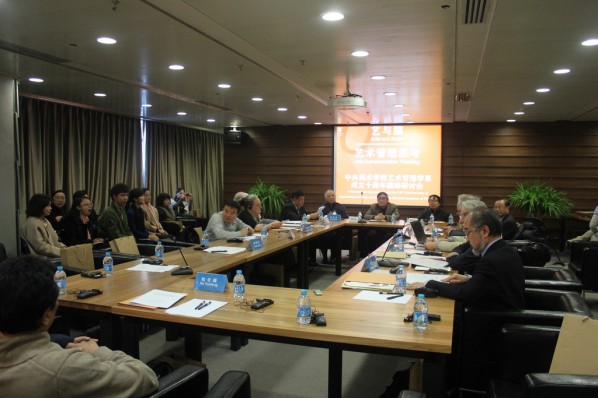
Hosted by CAFA, organized by Department of Arts Administration of the School of Humanities, CAFA, “Arts and the Brain - Arts Administration Thinking: International Symposium on the 10th Anniversary of Department of Arts Administration, CAFA” was held at the VIP Meeting Room in CAFA Art Museum. Pan Gongkai, President of CAFA, Yin Jinan, Dean of the School of Humanities, CAFA, Xie Dajing, President of China Arts Administration Education Association gave a speech at the opening ceremony Pan Gongkai initially introduced the history of the Department of Arts Administration, and said it was a significant international symposium, hoping it was of an high scholarly level, substantially promoting the development of the Department of Arts Administration, inspiring the whole art creation and education. Prof. Yin Jinan said there was both blue sky and haze in Chinese contemporary art, looking forward to promoting global art development by our wisdom. Xie Dajing said there was a promising prospect in Chinese Arts Administration as a future discipline.
Department of Arts Administration in CAFA has been established for ten years, and its development could be seen as an epitome of the development of arts management as an academic discipline in this country. The symposium was presided over by Prof. Yu Ding, Deputy Dean of School of Humanities, CAFA, twelve domestic and foreign keynote speakers respectively combined their own research fields to speak, Dr. Peng Feng, Professor of School of Arts, Peking University, Klaus Siebenhaar, Dean of School of Culture and Media Management of Berlin Freedom University. Luca Zan, born in 1953, is Director of Postgraduate Program of Management and Innovation Organization of Culture and Arts – Bologna University, Prof. He Yunfeng, Vice Director of Department of Music of Central Conservatory of Music, Tian Chuanliu, Professor of Shandong University of Arts and Deputy Secretary of National Arts Association, Sun-man Tseng, Adjunct Professor of Hong Kong Institute of Education, Kazuo Fujino, Professor of the Graduate School, Kobe University. Prof. Sandra Lang Landsman, Director of Visual Arts Administration M.A. Program, Prof. Fran?ois Colbert, Director of Department of Arts Management in HEC Montréal, Gong Jisui and Xie Dajing, distinguished professors of CAFA respectively gave their speeches. In addition, Prof. Li Jia from Department of Arts Management, Shenyang Conservatory of Music, Xing Yunfei, Director of Teaching Practice Office of Department of Arts Management, Shenyang Conservatory of Music, Zhao Le, Adjunct Professor of Department of Arts Management, Xinghai Conservatory of Music, Zhang Hanyu, distinguished professor of Department of Arts Management at the School of Humanities, CAFA, Wang Congcong, Director of Department of Arts Management at the School of Arts, Central Academy of Cultural Administration, Qu Yan, lecturer of Department of Arts Management, Tianjin Conservatory of Music, Zhang Rui, teacher of Tsinghua University, Xu Hengzhe, lecturer of the Department of Arts Management, Xinghai Conservatory of Music, Dong Feng, Professor of Nanjing University of Arts, and Lin Yi, Professor of Pecking University.
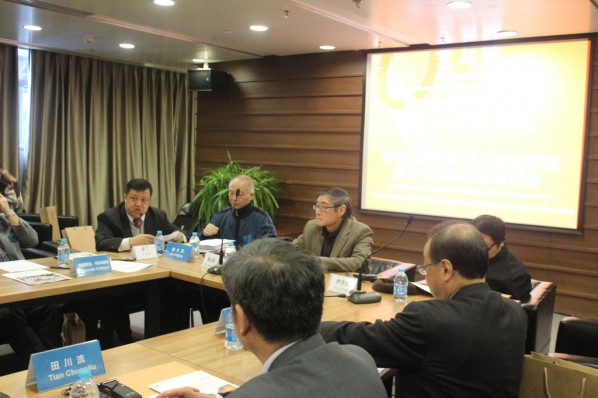
The international symposium started at 9:00 am and continuing to 17:30 on November 27, divided into two parts, respectively followed by a section of Q&A and discussion, the guests that were present further enriched the subjects of the speeches. After lunch there was a section of interaction when Yan Feng launched a keynote speech “Digitized Living”. Combined frontline teaching and research work to which he introduced the digital cultural heritage projects of some institutions such as the Palace Museum, as well as AAP applications which were produced by artists such as Prof. Tan Ping.
In addition, the opening ceremony of “China Arts Administration Education Annual Meeting” was held at the Auditorium of CAFA Art Museum on November 29, seven domestic and foreign scholars discussed the themes of “Boundary of the Arts and Industrial Development” and “Arts Administration Professional Plan and Arrangement for discipline”.
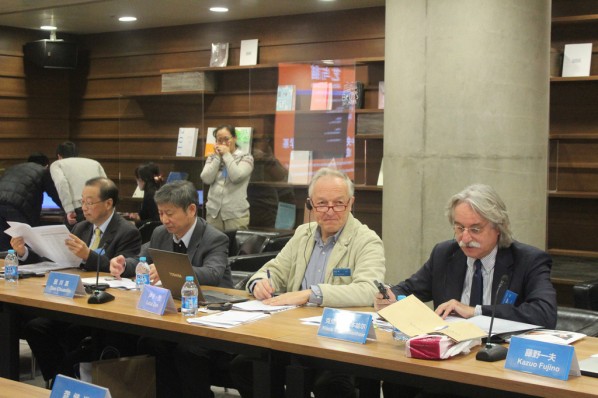
I Introduction of “A&B” Forum
Department of Arts Administration of Central Academy of Fine Arts (CAFA) has existed for ten years since its establishment in 2003. As a pioneer in China its development could be seen as an epitome for the development of arts management as an academic discipline in this country. In the last decade our world has undergone massive shifts and changes. Globalization, information and especially the development of new media like social networks have not only changed the tools and media of arts management, but the deep and fundamental shifts have happened in arts and culture itself. Thus we believe that the development of arts management has currently entered a critical stage, on which we need to move from a methodological level to an ontological level and reflect upon arts and culture itself. In other words, we have now come to a fork in the road and only when we have answered the basic question of who we are and where we are from, could we find the direction in which we are going. The main purpose of this forum is to discuss with colleagues from home and abroad about this basic issue.
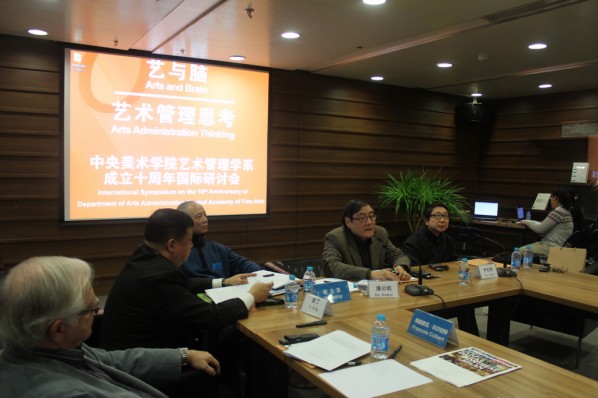
Arts management was born as an academic discipline firstly in the 1960s in the US and has extended in the following decades gradually to Europe and Asia. Since the very beginning it has never stopped “borrowing” knowledge and methods from other academic disciplines. Just as its name may indicate, the basic idea of the discipline in the construction of arts management is to introduce the methodology of management science into the realm of arts and culture. The macro background for this development is the overall economization of modern society. It is in this context that the realm of arts and culture has become part of the whole social economic phenomena. Culture has become part of a leisure market and an “industry”. The competition in the marketing of cultural products calls for the birth of cultural marketing. The development of the so-called cultural industries has raised new challenges to traditional culture workers. In response to the proper time and conditions, arts management was established as a discipline and a new profession.
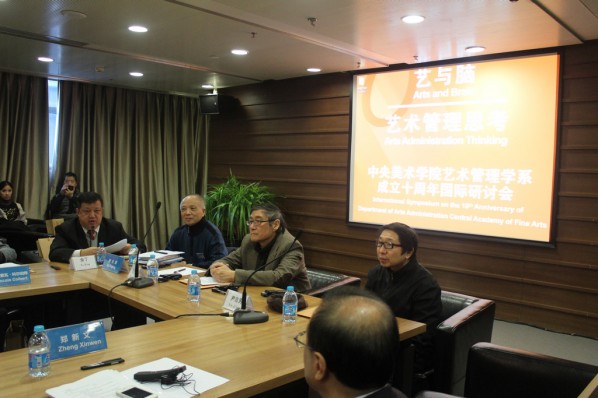
With the global economic crisis in the new millennium people are becoming more and more aware of the fact that the “economic prescription” is not the cure-all solution for arts and culture. Even the boom of “creative industries” with the new magic word “creativity” has to return eventually to the basic query: How indeed could the core of creative industries - creativity be enhanced? Alongside the economic aspect, the social function of arts and culture has gained importance in the past decades. Sociology and cultural studies have been emphasized in the academic teaching of arts management. It indicates on the one hand the reflection upon and the balance of the excessive dependency on arts management and economic management science, but on the other hand still does not give the real direction in which arts management as an academic discipline and a profession should go in the future.
“Exemplary persons are not mere vessels.”(Confucius). Just as people in the field of design are calling for the synthesising of “Design Thinking”, we believe that forerunners in arts management also need to unfold an “Arts Management Thinking”. We believe that the abbreviation “A&B” should stand for “Arts & the Brain” instead of merely “Arts & Business”. We believe that arts managers in the future should be “cultural warriors” who are not only “armed to the teeth” (methodology) but veritably “armed to the brain” (“arts management thinkers”). Through this international forum we expect to discuss with experts from home and abroad a new understanding of arts management on the basis of a fundamental reflection upon arts and culture.
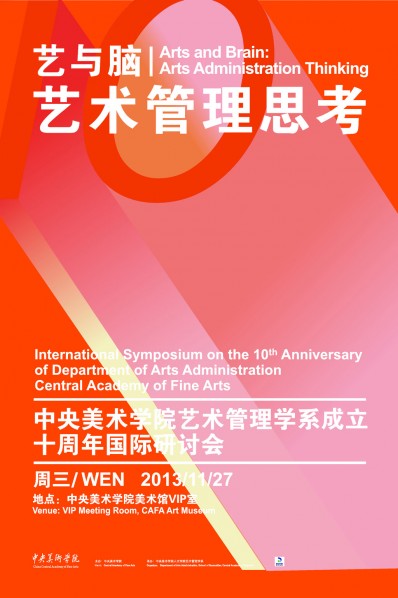
II Timeline
09:00 - 09:30 Opening Speeches by Pan Gongkai, Yin Jinan and Xie Dajing
09:30 – 09:50 Keynote Speech: Dickie’s Institutional Theory and Its Implications for Art Management by Peng Feng
09:50 – 10:10 Keynote Speech: Save the Brain, Save the Arts: Culture Management Thinking in 21st Century by Klaus Siebenhaar
10:10 – 10:30 Keynote Speech: Current Situation, Features and Prospect of Chinese Higher Education on Arts Management by Xie Dajing
10:30 – 10:45 Break
10:45 – 11:05 Keynote Speech: Arts Management: a European Perspective by Luca Zan
11:05 – 11:25 Keynote Speech: Thinking on and Ideas Renewal of Musical Arts Management – Centered on Major of Arts Management of Central Conservatory of Music by He Yunfeng
11:25 – 12:00 Q&A and Discussion
12:00 – 14:00 Lunch & Interaction: Digitized Living by Yan Feng
14:00 – 14:20 Keynote Speech: Basic Features of Chinese Contemporary Arts Management by Tian Chuanliu
14:20 – 14:40 Keynote Speech: What it takes for Arts Managers to become Cultural Guardians? By Sun Man Tseng
14:40 – 15:00 Keynote Speech: Today's Cultural Policy in Japan by Kazuo Fujino
15:00 – 15:20 Keynote Speech: Integrating Art into the Arts Management Curriculum by Sandra Lang Landsman
15:20 – 15:40 Break
15:40 – 16:00 Keynote Speech: As an Arts Manager in the Unity of Cognition and Practice: On Significance of Methodology of Artistic Sociology by Zhang Zhaoxia
16:00 – 16:20 Keynote Speech: Challenges to Arts Management Training In Our Changing World by Fran?ois Colbert
16:20 – 16:40 Keynote Speech: by Gong Jisui
16:40 – 17:20 Q&A and Discussion
17:20 – 17:30 Conclusion & Closing
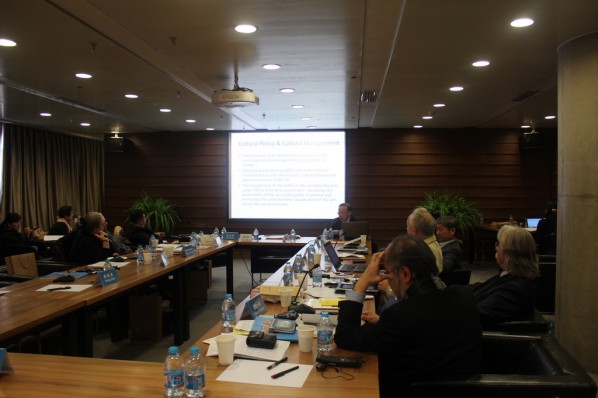
III Brief Introduction of Speakers(In Sequence of Speech Order)
Pan Gongkai is the President of China Central Academy of Fine Arts and vice-chairman of China Artists Association, as well as former principal of China Academy of Art. Prof. Pan is awarded Honorary Doctor of San Francisco Art Institute. He has published a number of proceedings and held many solo exhibitions in New York, Los Angeles, Hong Kong and UNESCO headquarters (Paris).
Yin Jinan, Dean of School of Humanities of Central Academy of Fine Arts, is a renowned art historian, critic of contemporary art, an expert in ancient Chinese painting and calligraphy appreciation. Prof. Yin is also a Distinguished Professor of Department of Archaeology in Graduate School of Chinese Academy of Social Sciences and Distinguished Researcher of Research Centre for Ancient Paintings and Calligraphy of Palace Museum.”Knocking at the Door Alone: a Close Look at the main streams of Chinese Contemporary Art” is his representative work.
Xie Dajing, President of China Arts Administration Education Association, Professor of the China Conservatory, Visiting Professor of Shanghai Conservatory of Music and Xinghai Conservatory of Music, is the founder of Department of Arts Management, China Conservatory. Prof. Xie is also former vice president of China Conservatory and the dean of the Department of Arts Management.
Peng Feng, Doctor of Philosophy, is Professor of School of Arts, Peking University, and Director of Department of Arts theories, PKU. Prof. Peng also serves as researcher at the Research Center for Aesthetics and Aesthetic Education of PKU, the Research Center for Cultural Industry of PKU, as well as Institute of Arts and Crafts of China Art Research Institute, and a member of the Executive Committee of the International Association of Aesthetics.
Klaus Siebenhaar, born in Germany in 1952, studied German literature, drama and art history in Berlin Freedom University and received a doctoral degree. Prof. Siebenhaar is former Dean of School of History of Media and the Application of Scientific Culture, and School of Culture and Media Management of Berlin Freedom University. He was also the leader of the Department of Art in the National Theatre of Germany. Prof Siebenhaar is experienced in teaching and practicing in the field of cultural management, and has published a number of writings, with well-recognized authority in the field of cultural research in Berlin.
Luca Zan, born in 1953, is Director of the Postgraduate Program of Management and Innovation Organisation of Culture and the Arts – Bologna University, and undertakes tasks in the teaching of art management in many artistic colleges and universities. He cooperated in many activities in international art management, and mainly researches the field of management. Also, he has experienced a lot of academic exchanges with CAFA.
He Yunfeng, Naxi from Yunnan, is an ethnic musician. He is Professor and Vice Director of the Department of Music of the Central Conservatory of Music. He is engaged in research and teaching on theories of Chinese ethnic music, art managing, cultural industry, oral and intangible cultural heritage. He was awarded 29 international awards including Golden Bell Awards. He has hosted and completed 19 national or municipal key research projects.
Tian Chuanliu, Professor of Shandong University of Arts and Deputy Secretary of National Arts Association, focuses on studies of artistic aesthetics. Prof. Tian has undertaken and completed many national subject researches and issued dozens of writings and received many awards.
Sun-man Tseng, Adjunct Professor of Hong Kong Institute of Education, Chair of 2013 Cultural Leadership Summit (Hong Kong), and Arts Advisor (Arts Management) of the Hong Kong Arts Development Council, focuses on consultancy in arts management training and develops programs for in-service managers. Tseng was once Executive Director of the Hong Kong Arts Festival Society, Secretary-General of the Hong Kong Arts Development Council. He served as Head of the Arts Administration Department of the Shanghai Conservatory of Music. His book “Principles of Arts Management” (in Chinese) is used as a textbook by many arts management programs.
Kazuo Fujino, Professor of Performing Arts, Cultural Policy and Arts Management at the Graduate School of Intercultural Studies, Kobe University. His area of specialization is the relationship between art and society mainly in the performing arts of Germany and Japan. In the last ten years, Professor Fujino has been focusing increasingly on arts education and arts management. Six years ago he founded the Kobe International Music Festival with students and citizens of Kobe.
Sandra Lang Landsman, Director of Visual Arts Administration M.A. Program and Associate Professor in the Department of Art and Art Professions at New York University’s Steinhardt School of Culture, Education and Human Development, USA. The VAA MA Program offers a combination of courses from art history and arts management as well as business courses at Stern School of Business. Ms. Landsman teaches courses such as "The Environment of Visual Arts Administration", "Curatorial Practice", "Corporations and the Arts", and the Program's thesis sequence. Ms. Landsman was formerly the Executive Director of both the International Fine Print Dealers Association and the Independent Curators International; she was also Administrative Director of Art Advisory Service at The Museum of Modern Art. She holds a master degree from Columbia University’s Graduate School of Business and a B.A. from Middlebury College, Vermont.
Zhang Zhaoxia, current Director of the Department of Art Communication, Beijing Dance Academy, has participated in many academic activities and published numerous essays, winning quite a number of awards. Zhang has been engaged in the creation of many dances and dramas and guided her students to win awards in the National Competition of Artistic Project Planning of Undergraduates many times. Zhang has hosted or undertaken lots of dance activities.
Fran?ois Colbert, professor of marketing at HEC Montréal, where he holds the Carmelle and Rémi Marcoux Chair in Arts Management and heads the diploma program in Arts Management. He is Founding Editor and Executive Director of the International Journal of Arts Management and author of Marketing Culture and the Arts, a classic textbook that has been translated into 10 languages. In 2002 he was awarded the Order of Canada for his many achievements and his unique contributions in developing the field of arts management. He is the author of Marketing Culture and the Arts and is currently Vice-Chair of the Canada Council for the Arts.
Gong Jisui, distinguished professor at CAFA. In 1982, he graduated from Peking University with a degree in Philosophy. During the years 1985 to 1993, he studied for his PhD at the University of Washington, majored in Chinese Art History and received his master degree in 1991. Between 1993 and 1996, he worked as the director at Sotheby’s North America Chinese painting and calligraphy department, in charge of the Chinese classical calligraphy auction in North America and Chinese oil painting auction in Hong Kong. In 1996, he started Xi Yuan International Art Consulting Company; primarily focusing on all kinds of Chinese art valuations. In 2003, he started working at the School of Humanities, CAFA; establishing a series of new courses, which includes art trade studies, art valuation theory and practice, and art markets and financial research. He is also responsible for teaching Chinese traditional cultural relics plates and organized outside expert’s resources. He also teaches Chinese pottery, traditional Ming & Qing dynasties’ furniture, and Tibetan Buddhist art.
Yu Ding, professor, Ph.D. Advisor, and founding director of Department of Arts Administration in Central Academy of Fine Arts (CAFA). He graduated from Department of Art History in CAFA in 1989 and worked as editor of CAFA’s journal “World Art”. In 2000 he obtained his doctorate. In 2002 he started with others in establishing the arts administration program in CAFA. Now he is Vice Dean of School of Humanities at CAFA, Director of the Department of Arts Administration. He co-founded China Arts Administration Education Association (CAAEA) and served as Vice President and Secretary-General. He is the author of inter alia China Oil Painting Document 1542-2000, Introduction to Arts Administration Studies, and Respect for Art: Visual Arts Administration and Management in China and the United States (co-author), etc.
Journalist: Ye Yuanfeng, translated by Chen Peihua and edited by Sue/CAFA ART INFO.


